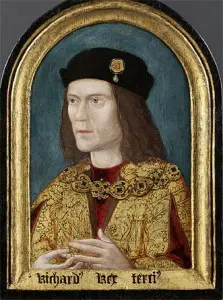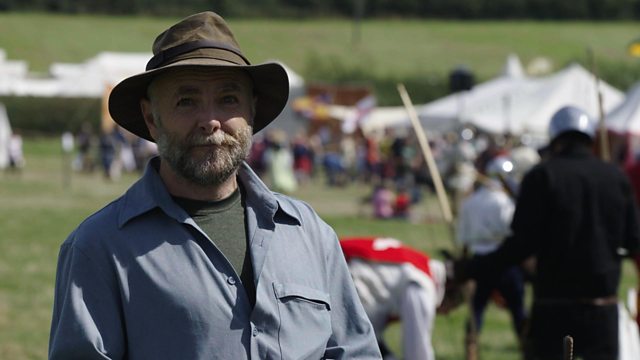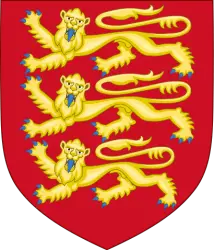 On 7th November 1485, at King Henry VII's first Parliament, the late King Richard III and twenty-eight of his supporters were attainted, i.e. declared guilty of treason by bill of attainder.
On 7th November 1485, at King Henry VII's first Parliament, the late King Richard III and twenty-eight of his supporters were attainted, i.e. declared guilty of treason by bill of attainder.
Raphael Holinshed records what happened at this Parliament, which was held just over two months after Henry VII's victory and Richard III's death at the Battle of Bosworth:
"For the establishing of all things, as well touching the preseruation of his owne estate, as the commendable administration of iustice and preferrement of the common wealth of his realme, he called his high court of parlement at Westminster the seauenth daie of Nouember, wherein was atteinted Richard late duke of Glocester, calling and naming himselfe by vsurpation, king Richard the third.
Likewise there was atteinted as chéefe aiders and assistants to him in the battell at Bosworth, aduanced against the present king, Iohn late duke of Norfolke, Thomas earle of Surrie, Francis Louell knight vicount Louell, Walter Deuereux knight late lord Ferrers, Iohn lord Zouch, Robert Harrington, Richard Charleton, Richard Ratcliffe, William Berkeleie of Welete, Robert Middleton, Iames Harrington, Robert Brakenberie, Thomas Pilkington, Walter Hopton, William Catesbie, Roger Wake, William Sapcote of the countie of Huntington, Humfrie Stafford, William Clerke of Wenlocke, Geffrie saint Germaine, Richard Watkins herald of armes, Richard Reuell of Derbishire, Thomas Pulter of the countie of Kent, Iohn Welsh otherwise called Hastings, Iohn Kendall late secretarie to the said Richard late duke of Glocester, Iohn Bucke, Andrew Rat, and William Brampton of Burford.
In which atteindor neuerthelesse there were diuerse clauses and prouisos for the benefit of their wiues and other persons, that had or might claime anie right, title, or interest lawfullie vnto anie castels, manours, lordships, townes, towneships, honours, lands, tenements, rents, seruices, fée farmes, annuities, knights fees, aduousons, reuersions, remainders, and other hereditaments; whereof the said persons atteinted were possessed or seized to the vses of such other persons: with a speciall prouiso also, that the said atteindor should not be preiudiciall to Iohn Catesbie knight, Thomas Reuell, and William Ashbie esquiers, in, of, & vpon the manour of Kirkebie vpon Wretheke in the countie of Leicester, nor in, of, and vpon anie other lands and tenements in Kirkebie aforesaid, Melton, Somerbie, Thropseghfield, and Godebie, which they had of the gift & feoffement of Thomas Dauers, & Iohn Lie. And further, notwithstanding this atteindor, diuerse of the said persons afterwards were not onelie by the king pardoned, but also restored to their lands and liuings."
Henry VII had backdated his reign to 21st August 1485, the day before the Battle of Bosworth, thereby making all those who supported Richard III at the battle traitors. You can see a clip from "Henry VII: Winter King" explaining this at http://www.bbc.co.uk/programmes/p019xg7c
Notes and Sources
- Raphael Holinshed's Chronicles of England, Scotland, and Ireland, 1587 edition, Volume 6, p. 762. Read online at The Holinshed Project
Further Reading/Viewing
- Henry VII: Winter King video
- Penn, Thomas (2012) Winter King: The Dawn of Tudor England
- "Henry VII's First Parliament" - https://thehistoryofparliament.wordpress.com/2013/05/29/henry-viis-first-parliament/
- "The Battle of Bosworth: consequences for winners and losers" - https://thehistoryofparliament.wordpress.com/2014/08/22/the-battle-of-bosworth-consequences-for-winners-and-losers/



Backdating his reign by one day – shows what an untrustworthy individual Henry VII was.
If anyone who followed King Richard is a traitor…(Yes,I’m following King Richard too,it’s not grammar mistake.)
Then, H7 himself was a robber,a pretender a murderer and a usurper!
Surely it was normal practice to declare yourself King in advance if you believe that your claim is righteous, discouraging all those who would from fighting against you. By dating his rule from before the Battle Henry and any other alternative King is telling you that you are a traitor to take up arms and the penalty is death. At the end of the day Henry Tudor, unlike Edward IV and Henry Vi in the person of his wife, Margaret of Anjou, only attained 30 people. Most were pardoned or after being in prison were released and land restored. He executed one person, William Catesby, after the battle, and two others in association with this who had endangered and attacked his troops. There was not the usual executions of leading nobles as there had been during the Wars of the Roses. The ordinary soldiers were sent home under his protection.
There is no evidence that Henry Tudor was a murderer any more than there is against Richard. Richard did not usurp the throne, he believed that he had a legitimate claim as his nephews were illegitimate. He was offered the crown by the three estates. Henry Tudor could also claim that he was vindicated as the rightful claimant as he had won in mortal combat, winning the crown on the battlefield was a recognized right as it showed the claimant was blessed by God. In reality Henry was saved by the betrayal of Richard lll by Stanley. But who wins writes the propaganda. Edward IV also won and usurped the crown in right of his father’s earlier claim, but the grandfather of Henry Vi, Henry of Bolingbrook (Henry IV) had definitely usurped the crown and murdered Richard II. Edward IV was himself deposed, but returned to again win the crown in battle. After Barnet, Tewkesbury, St Albans and Mortimer Cross, several executions took place, and Towton was one big orgy of killing during and after the battle. Bosworth was not followed by either, save the one mentioned above. Dating his reign to the day before was hardfaced, not sinister.
Henry did not accuse Richard of the murder of his(Richard’s) nephews Inthis attainder. Were they then still alive after Bosworth as many have claimed?
Hi Caroline, yes, that is a significant fact that Henry didn’t specifically accuse Richard of their murder, but then he was on very difficult ground. Henry had strong supporters of Richard, including a man who was potentially his heir, John de la Pole, Earl of Lincoln and his parents, including Elizabeth, Edward’s iv sister and the Duke of Suffolk.
The second question is more difficult to answer because nobody knows for certain. Many debates have taken place over the decades and nobody can provide proof one way or another. A growing number of historians believe the former Edward V and Richard Duke of York did survive and the latter for several years. There are tantalising clues but nothing definite. Other more Conservative historians believe they died or were killed between 1483 and 1485 either on the orders of Richard, by someone else or by a cause unknown. No bodies were produced by either Richard or Henry, nor living boys or prisoners. The former was better for both, the latter caused legal problems for Henry. Both Kings kept silent and had problems with rebellions and Henry had a series of pretenders for most of his reign. Henry is meant to have searched the Tower but we don’t know if he ever did. Remember he also declared them legitimate, which was a dangerous move if they were indeed alive. The possibility remains tantalising, the fact is the opposite is also a sad possibility and for many, the more realistic outcome. One last thing, Henry had just as much reason to kill them as Richard, they were two growing male claimants. It’s a very tragic state of affairs and I would love an answer. I really doubt one will ever be confirmed either way.